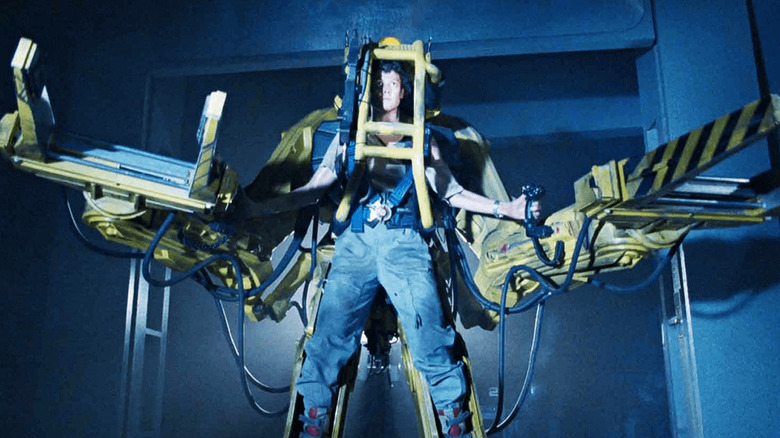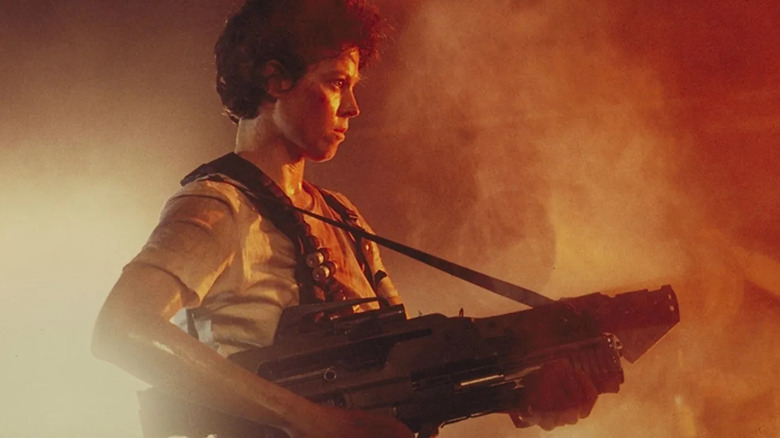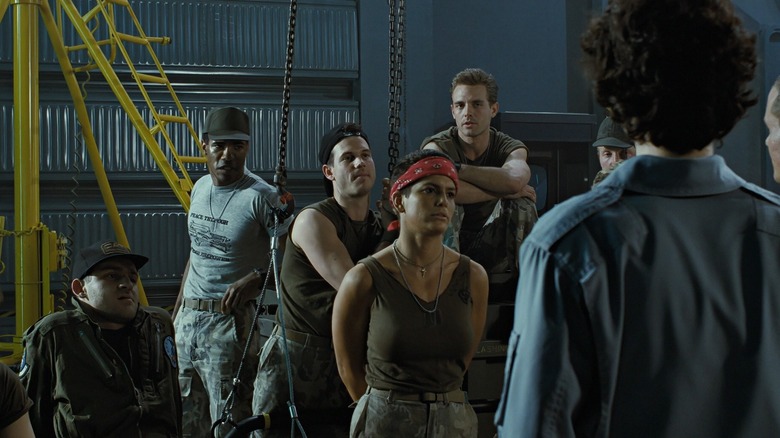Why The Aliens Crew Made James Cameron's Life Hell While Shooting The Acclaimed Sequel
To have an inkling that the movies of director James Cameron are difficult to make, one only needs to watch them. After all, it's still astonishing that the filmmaker was able to bring to life a liquid metal man in "Terminator 2," to re-enact the sinking of the Titanic with stunning accuracy in "Titanic," and to create an entire alien world from scratch in the "Avatar" series. Compared to these feats, it would seem that his 1986 sequel "Aliens" might've been a walk in the park, relatively. It's the sort of film that someone like Cameron, who graduated from the unofficial school of Roger Corman's genre-focused studio, New World Pictures, was destined to make after working on pictures like "Battle Beyond the Stars" and "Galaxy of Terror."
By all accounts, "Aliens" had as trying a production as "The Abyss" or "Titanic," only it wasn't the elements or logistics that made shooting a burden. Instead, it was the extremely tenuous relationship between Cameron, producer Gale Anne Hurd, and the mostly English crew. Although the play-by-play of the issues between Cameron, his then-wife Hurd, and the crew have been litigated over the years in various interviews, books, DVD special features and the like, a recent appearance by star Sigourney Weaver on a panel at New York Comic Con celebrating the film's upcoming 40th anniversary shed a little more light on the matter, at least from her perspective. According to Weaver, a major bone of contention that the crew had against the then-unknown Cameron was that he was making a sequel to a Ridley Scott film (1979's "Alien," naturally) and Scott was not involved (something which also upset the actual man, as well). This made the crew trepidatious toward Cameron, and thus, they made his life hell while shooting an already complex sequel.
Sigourney Weaver says the Aliens crew 'did have an attitude' toward James Cameron
Thanks to the lower cost of shooting in the UK at the time, 20th Century Fox insisted on the movie being made in England at Pinewood Studios, where "Alien" had been shot seven years earlier. Thus, a number of crew members had worked with Ridley Scott on that film and "Legend" even more recently, and didn't take kindly to Cameron taking over what they perceived to be Scott's property. As Weaver said at NYCC, this was the root of the conflict:
"What I remember is that they really loved Ridley, and they wanted Ridley to be directing this second film. They didn't know who Jim Cameron was. I didn't really know who he was. I just thought he wrote a great script"
Indeed, Cameron at that point was only just emerging onto the filmmaking scene. His first movie as credited director, "Piranha II: The Spawning," was a feature that was essentially taken away from him by producer (and uncredited co-director) Ovidio G. Assonitis, and his second feature, "The Terminator," had only just been released before "Aliens" got underway. As Weaver explained, Cameron "kept setting up screenings" of "The Terminator" in order to illustrate to the crew that he was the real deal, but none of them would turn up: "So they did have an attitude. And it did take a while [for them to get along], actually."
For her part, Weaver had no such doubts about Cameron:
"I loved Jim right away. It was very easy for me to go around and go, 'Listen, I love Ridley too, but this guy wrote this and this film 'Terminator,' and he knows what he's doing. He's a natural."
The Aliens crew exploited a culture clash to really get Cameron's goat
Unfortunately, Weaver's words of support weren't universally felt, as Cameron, Hurd, and key crew members (especially assistant director Derek Cracknell) duked it out (metaphorically, of course) during filming. In addition to the crew's general poor attitude and Cameron's penchant for jumping in and doing work that went against union rules, the biggest point of contention between the parties revolved around a bit of English tradition. Apparently, it was customary at Pinewood for a tea trolley to come around to the stages twice a day, and the entire crew would drop whatever they were doing for a 15-minute break. This apparent disinterest in their work caused Cameron to see the crew in a harsh light when compared to the hungry young filmmakers and crews that he'd worked with in Los Angeles. As he said in Rebecca Keegan's "The Futurist: The Life and Films of James Cameron" book:
"Gale and I were shocked to be working with people who simply couldn't care less about the film they were working on. The Pinewood crew were lazy, insolent and arrogant. [,,,] For the most part, we despised them and they despised us."
Eventually, all of this festering tension came to a head when Cameron and Hurd fired Cracknell, the crew mutinied, and an hours-long meeting was held where the two sides came to a tacit understanding just so "Aliens" could get finished. Of course it was, and while there never developed any affection between the groups, one hopes that some respect was given. According to Weaver, it was: "And by the end, of course, they were devoted," she recalled. As Cameron has proved numerous times with his incredible successes, the adage "pain is temporary, film is forever" couldn't be more true.


